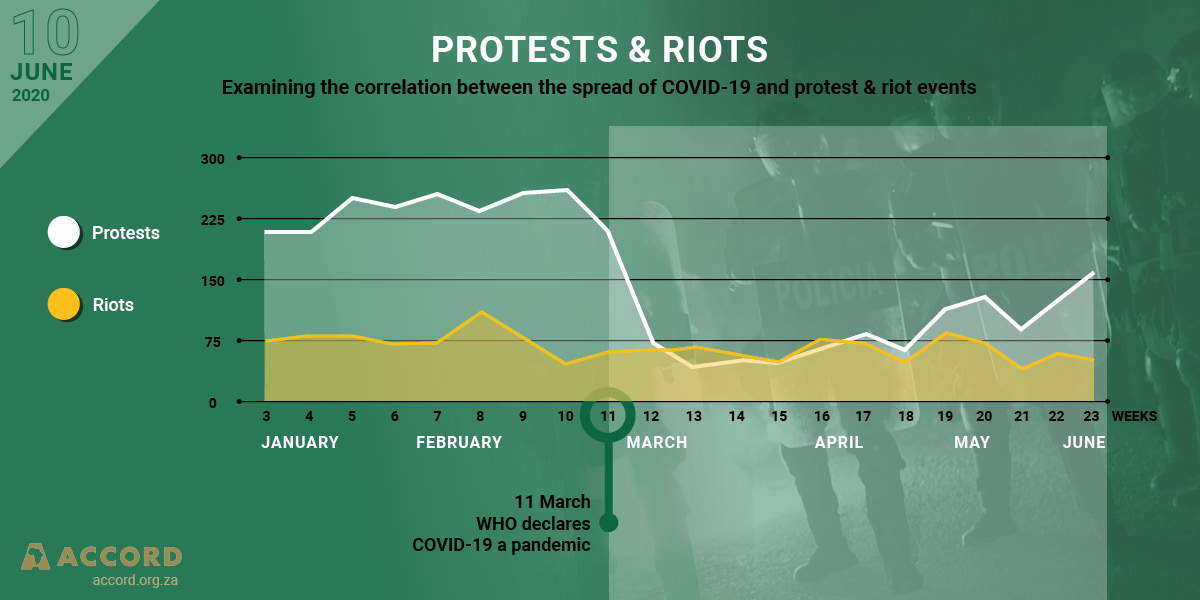Two months into their countrywide lockdowns, African governments have been faced with having to balance the threat of the virus with the increasing threat to livelihoods as a result of the restrictive measures that were put in place. These measures not only exacerbated the triple challenges of poverty, inequality and unemployment, but also saw a high number of arrests of people who failed to comply with these measures. While the spread of the virus continues to increase, some African governments have eased their lockdown restrictions to address livelihood vulnerabilities and enable people to resume employment, as well as to restore some civil liberties that were initially denied. This article provides an overview of the African countries that have eased lockdown measures, and the emerging peace and security trends that have emerged.
Ghana was one of the first countries to ease restrictions, when President Nana Akufo-Addo lifted the three-week lockdown in its two main cities, Accra and Kumasi, where non-essential businesses reopened. This decision was based on an improved tracking of the disease, as well as to protect the economy. Ghana also reportedly cut its 2020 gross domestic product (GDP) growth forecast from 6.8% to 1.5% – a rate that would represent its worst performance in nearly four decades. Therefore, there was an urgent need to balance public health with economic realities.
When Angola’s state of emergency ended on 25 May, the government introduced a state of calamity in which some measures will be gradually eased. Angola was already faced with a weak economy prior to the lockdown, and the country’s crude oil prices decreased by at least 66% internationally since the beginning of the year. It has been forecasted that Angola’s economy will contract by 2.8% this year, slowly recovering to 0.9% in 2021. In Zimbabwe, lockdown restrictions eased two weeks after being implemented. This was in light of the fact that the country is currently facing its worst economic crisis in nearly 10 years and the COVID-19 measures created a further threat to livelihoods. In spite of the eased lockdown, 1 312 people were arrested for flouting regulations aimed at containing the spread of the coronavirus. A total of 52 000 people were arrested since a nationwide curfew was declared on 31 March.
African countries are entering a new phase where are trying to balance both the spread of the virus and the opening up of their economies.
Tweet
Nigeria has the third-highest number of infected cases on the continent. On 4 May, the country eased its lockdown to recover the heavy economic loss it suffered and enable citizens to recover their daily earnings. However, the COVID-19 threat remains a concern in the country, as the mortality rate stands at 3.1%. This is higher than some of its neighbours. Ghana, for example, which has a similar age demography and socio-economic characteristics, is reporting a mortality rate of 0.5%.
During the second week of May, Senegalese President Macky Sall announced the easing of some restrictions, which included the reopening of mosques and churches, but stated that the curfew would remain in place. However, there have been violent protests in the capital city of Dakar due to these restrictions. More than 70 people were arrested as violence broke out in several cities across the country, demanding that the night-time coronavirus curfew be lifted. In Touba, a religious hub 200 km east of Dakar, three police vehicles and an ambulance were set ablaze and a coronavirus treatment centre was attacked.
South Africa implemented some of the strictest lockdown measures on the continent, which limited movement and trade and shut down the economy. Approximately 230 000 people were arrested for contravening levels 5 and 4 lockdown regulations. Whilst the country still has the highest infection rate on the continent, restrictions were eased to level 3 – which has seen a reopening of most sectors of the economy, but with restricted capacities. The tobacco ban that has remained in place at level 3 has created a rise in the illicit trade in cigarettes and, further, the commencement of legal proceedings between tobacco manufacturers and the government. In a turn of events, the Pretoria High Court ruled that a number of disaster regulations were unconstitutional and invalid, as they encroached on rights that are guaranteed in the Bill of Rights contained in the Constitution.
The coming weeks could possibly see further tensions and even confrontation between states and citizens as African countries try to balance both the spread of the virus and the opening up of their economies, in an effort to ease the negative impacts on livelihoods, whilst also protecting fundamental basic human rights.

